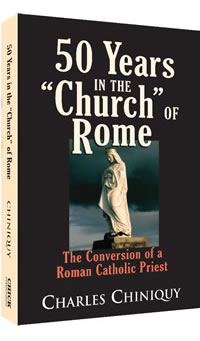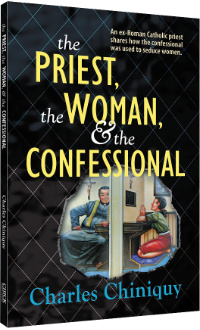Sex Scandal Has Catholicism Redesigning Confessional
Roman Catholic leaders are reexamining the confessional box design in light of the recent sex scandals. Typically, penitent and priest enter adjacent little rooms with some form of wall between them. In that wall is a screen window that allows conversation between them.
Fear by the priests of false accusation and concern to make the penitent more comfortable is prompting the redesign to a more open and visible layout. Some bishops have mandated that children's confessions be held in the confessional with the doors open or in the open church.
The whole arrangement is based on Catholic teaching that the sinner must confess his sin to a priest to obtain forgiveness. Several evils evolve from this unbiblical practice.
In the past and possibly today in some parts of the world, the priest was required to ask very pointed questions about various sins so that the penitent would not forget or intentionally omit important sins that could damn him or her to hell.
Charles Chiniquy was a priest who tried hard to reconcile the teaching of his "church" with the Bible. After finally coming out of Catholicism, he wrote a detailed account of his struggle. In his book, 50 Years in the Church of Rome, he describes in some detail how he was required to put the most suggestive questions to innocent young penitents. The temptation for both priest and penitent became extreme during and after such provocative discussions.
This was, of course, in French Canada during the 1850s. Today, Roman Catholics, especially in America, do not generally experience such direct and provoking questioning. This does not, however, make the practice biblical.
One of the other evils of the confessional is the promotion of vain repetition. The sinner is required to make a detailed confession of all his sins to a mere man who supposedly has the power to forgive those sins and stipulate a punishment.
Most usually, the punishment involves repeating some rote prayer a number of times: 10 Hail Marys or 5 Our Fathers. These vain repetitions only leave the sinner with a false sense of forgiveness and a feeling that the whole business is nothing more than a game.
No where in the Bible is this method of getting forgiveness taught or demonstrated. Thomas Heinze, in his book Answers to My Catholic Friends, points out that even in the Lord's Prayer the request for forgiveness is directed to God. None of the Apostles invited confession to themselves or presumed to forgive someone's sin.
Heinze points out that confession to a priest did not become official Catholic doctrine until 1225 AD.
The poor Roman Catholic is convinced that the church owns his passport to heaven and if he doesn't play the game right, he is guaranteed damnation in hell.
The apostle John says "If we confess our sins, He is faithful and just to forgive us our sins..." The context in 1 John 1 makes it clear that it is to God we are to confess and it is He who will forgive, not to a priest who has usurped God's place and claims power to "absolve" from sin.
Even the Pharisees knew this was blasphemy. When Jesus told someone his sins were forgiven, they reacted: "Who can forgive sins but God." (See Mark 2:7.)
Jesus could forgive because He was God. The priest claims to be "another Jesus" but his claim is false and those who trust in him need to know the truth.
- See more articles on related topics:
- Catholicism
- Papacy
Other Articles from September/October 2002:
- Sodomites Moving in on Children's Clubs
- International Criminal Court
Brings One World Government Closer
- What's In a Name? God says, 'A Lot!'
- Billions of Years?
- Chick Mail Bag Sep-2002
- Radical Muslims Recruiting in U.S. Prisons
- Prison Ministry Letters: Sep-2002
- Tract Passing Tips
- Court Declares Door-to-Door Witnessing Protected
More on Catholicism:
Products of Interest:
-

50 Years in the Church of Rome
368 pages
This classic work shows how this priest began to question Catholic teachings until he became saved, and led his entire parish to salvation. -

Priest, Woman & Confessional
144 pages
Former priest reveals a tragic danger of the confessional. -

Answers To My Catholic Friends
64 pages
A gentle witness you can give Catholics that deals with venerating images, purgatory, where popes go when they die, and more.



